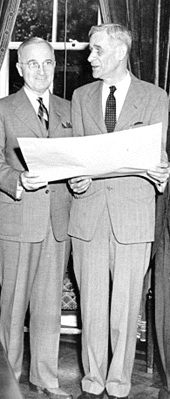Charlie Ross (journalist)
Charlie Ross | |
|---|---|
 | |
| 5th White House Press Secretary | |
| In office May 15, 1945 – December 5, 1950 | |
| President | Harry S. Truman |
| Preceded by | Jonathan W. Daniels |
| Succeeded by | Stephen Early (Acting) |
| Personal details | |
| Born | Charles Griffith Ross November 9, 1885 Independence, Missouri |
| Died | December 5, 1950 (aged 65) Washington, D.C. |
| Political party | Democratic |
| Spouse | Florence Griffin |
| Education | University of Missouri, Columbia (BA) |
Charles Griffith Ross (November 9, 1885 – December 5, 1950) was a White House Press Secretary between 1945 and 1950 for President Harry S. Truman.[1]
Early life
Ross graduated with Truman and Truman's eventual wife Bess Truman in Independence, Missouri from Independence High School (now known as William Chrisman High School), Class of 1901. He was initiated into the Sigma Chi fraternity and graduated from the University of Missouri in 1905. In 1908, he became the first professor of the newly formed Missouri School of Journalism.
Pulitzer Prize

In 1918, he became the Chief Washington correspondent for the St. Louis Post-Dispatch. He won the 1932 Pulitzer Prize for his article titled, "The Country's Plight—What Can Be Done About It?", a discussion of the economic situation of the United States.
In 1934, he became the editorial page editor for the Post-Dispatch and then in 1939 became a contributing editor for the paper.
White House Press Secretary
In 1945, Truman asked him to become his Press Secretary.
Despite Ross' personal relationship with Truman, he was to be accused by reporters of not running a tight ship in coordinating press releases, not being aware of everything going on in the Presidency, not burnishing the President's image, not being aware of the needs for spot news, and being a poor public speaker.[citation needed]
Reputation for trustworthiness
However, Ross' personal relationship with Truman had its advantages, as reporters knew Ross spoke for the president both on and off the record. Very few reporters felt Ross led them astray either.[2]
Death
Ross died of a coronary occlusion at his desk in the White House in December 1950 after giving a press conference as he was preparing to make some comments to the television news. He was buried in Washington's Mount Olivet Cemetery.
Family
His widow, Florence Griffin, married The Kansas City Star editor Roy A. Roberts in 1953.
References
- ^ Video: Air Forces Come Home Via Bomber, 1945/05/28 (1945). Universal Newsreel. 1945. Retrieved February 20, 2012.
- ^ *National Archives biography
External links
- 1885 births
- 1950 deaths
- American male journalists
- Editors of Missouri newspapers
- Journalists from Missouri
- Pulitzer Prize for Correspondence winners
- Truman administration personnel
- University of Missouri alumni
- University of Missouri faculty
- White House Press Secretaries
- William Chrisman High School alumni
- Writers from Independence, Missouri
- American journalist, 19th-century birth stubs

